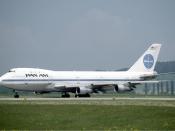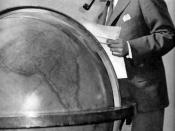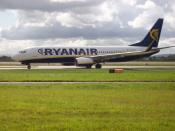I. Airline Industry Overview Traditionally airline industry has always been very sensitive to economic growth cycles. This simply means that when the economy flourishes (i.e. high GDP and NI figures) the airline industry will flourishes too. These two markets have a very strong positive correlation.
Furthermore, foreign exchange rates play a very important role in this industry since all aircraft purchases and leases, and fuel are paid in US$ regardless of what the home currency of the company might be. Usually foreign personnel are paid in their own currency rather than that of the airline's home base, and as one might expect most of the revenue will be in foreign currency. This is why many airlines use financial hedging techniques to overcome uncertainty.
The airline industry was once governed by government regulations (based on the Chicago convention), but over a period of almost 10 years this industry has been privatised and now-a-days these regulations are non-existent.
Although in regards to airport time-slot allocation, preference is still given to the domestic Flag-Carrier.
[further Industry details such as new laws (formation of EU, EU laws), industry life cycle] II. Ryanair's history Overview As mentioned earlier the success of a new entrant would be more likely at times of high demand, and that was the time during which Ryanair was established. The Ryan family started in the airline business with their majority stockholding in Guinness Peat Aviation (during the early 1980's) which then became the world's largest aircraft leasing company and Boeing's biggest ever customer. But due to financial difficulties GPA has been absorbed by GEC of America.
Ryanair was founded in 1986. It's history can be conveniently divided into two parts. Prior the restructuring of the company in 1991 and the time after restructuring.


